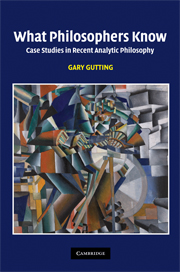Book contents
- Frontmatter
- Contents
- Acknowledgments
- Introduction
- PART I HOW DOES THAT GO? THE LIMITS OF PHILOSOPHICAL ARGUMENT
- PART II ARGUMENTS AND CONVICTIONS
- 5 Turning the tables: Plantinga and the rise of philosophy of religion
- 6 Materialism and compatibilism: two dogmas of analytic philosophy?
- 7 Was there a Kuhnian revolution? Convictions in the philosophy of science
- 8 Conviction and argument in Rawls' A Theory of Justice
- PART III PHILOSOPHICAL TRUTH AND KNOWLEDGE
- References
- Index
5 - Turning the tables: Plantinga and the rise of philosophy of religion
Published online by Cambridge University Press: 05 June 2012
- Frontmatter
- Contents
- Acknowledgments
- Introduction
- PART I HOW DOES THAT GO? THE LIMITS OF PHILOSOPHICAL ARGUMENT
- PART II ARGUMENTS AND CONVICTIONS
- 5 Turning the tables: Plantinga and the rise of philosophy of religion
- 6 Materialism and compatibilism: two dogmas of analytic philosophy?
- 7 Was there a Kuhnian revolution? Convictions in the philosophy of science
- 8 Conviction and argument in Rawls' A Theory of Justice
- PART III PHILOSOPHICAL TRUTH AND KNOWLEDGE
- References
- Index
Summary
For at least the first half of the twentieth century, there was no such thing as the philosophy of religion among analytic philosophers. Most analytic philosophers rejected religion as at best rationally gratuitous and at worst meaningless and, in any case, saw no need for serious, prolonged philosophical discussion of its ideas and status. This situation began to change around 1950, as witnessed by the still remarkable volume edited by Anthony Flew and Alasdair MacIntyre, which gathered papers by philosophers (a roughly equal mix of believers and non-believers), all working in the analytic tradition and sharing “a concern with theological questions, and a conviction that these call for serious and particular treatment” through philosophical analysis and argument. The editors noted that they would have liked to described the pieces they collected as essays in “the philosophy of religion,” but did not do so because “this expression has become, and seems likely for some time to remain, associated with Idealist attempts to present philosophical prolegomena to theistic theology” (viii). Their title spoke instead of “new essays in philosophical theology.”
Although the volume represents a new opening to religious questions, it still presents religion as distinctly under siege from analytic philosophy. A dominant issue is whether religious language even meets the standards of meaningful discourse, and although there are several discussions of theistic proofs, no one defends their soundness. Even the essay by the Christian co-editor, Alasdair MacIntyre, attacks arguments from religious experience.
- Type
- Chapter
- Information
- What Philosophers KnowCase Studies in Recent Analytic Philosophy, pp. 105 - 121Publisher: Cambridge University PressPrint publication year: 2009



